It’s remarkable how 13-year-old Whitman Spires is playing basketball outside.
His muscles stretch as they move, and hand-eye coordination is required to shoot the ball into the hoop. He’s able to keep his stamina, pushing forward as the blood pumps through his body. His energy levels are steady, no active pain is happening. Next to him, cars speed on the highway, focused on the road. To them, nothing astonishing or noteworthy is happening, just another normal day.
But as his mother looks out the window of the school and smiles at the basketball court with tears lacing her eyes, it’s apparent that this isn’t just a quick game after school.
This is a boy who finally has some sense of normalcy in his life, the same boy that couldn’t walk without his knees buckling a few years ago; he was in pain every day. His mother stayed up night after night researching, in hopes that he could get his life back. This isn’t a process that happened overnight or over a few months, this has been years in the making. It’s the journey of a warrior and family who held tight onto faith.
***
Hannah and Chris Spires were busy parents of four kids, Hannah, the owner of Hannah B’s, a children’s boutique and Chris, the pastor of First Baptist Church in Murrells Inlet, S.C. Despite their busy schedules and demanding personal life, they decided to take a break for the night and wind down. Hannah said they hired a babysitter and went out to dinner. It was a normal date night for them, chatting about life over a meal.
Little did they know how their life was about to turn upside down.
The Spires were at their families’ lake house back in June 2020. At the time, 9-year-old Whitman Spires was playing outside. While doing this, he was bitten by a tick on his left side between his neck and shoulder. However, he didn’t show any symptoms of illness and the damage left behind was similar to a mosquito bite.
They moved on with their regular life after the bite.
Whitman’s teachers and his parents cited him as a smart kid. He was the overachiever that read all seven of the books in the Harry Potter series; a child who received stellar report cards. So, it wasn’t like Whitman to want to miss school. He woke up that morning after his parent’s date night still complaining about a stomachache. Hannah told him to go to school, hoping it would get better, she dismissed it as just a run-of-the-mill pain that would eventually go away, like they always did. When Whitman got in the car at the end of the school day, he was still upset over the pain. Hannah started driving and noticed how every speed bump she hit going out of the school’s parking lot caused him to cry out in pain, and that was the moment she knew this was different.
Hannah took her other three kids home and drove Whitman to their family doctor. The doctor pressed down on his lower right quadrant to confirm that he was having appendicitis. The doctor referred them to the emergency room. When Whitman went to the ER, he developed an allergic reaction to the CT contrast before his CT scan. Therefore, the doctors waited to do the appendectomy until the next morning, to give his airways time to clear.
Appendicitis affects 70,000 children in the U.S. per year, according to the Cleveland Clinic. Therefore, it’s a surgery that should only take about two to four weeks to recover from. However, Whitman suffered from severe pain after his appendectomy. He was unable to return to school and his parents worried more every passing day. Finally at his two-week follow up appointment, the doctors discovered a potential abscess, which is a pus-filled pocket. From there, he was directed to Conway Medical Center, where the whole situation took a turn for the worse. Whitman quickly became unable to walk, vomited consistently and lost control of his bowels. From there, he was taken by ambulance to the Medical University of South Carolina, and doctors went in to drain the abscess only to hit a large blood clot called a hematoma. Because of this, there was nothing else they could do.
“At that point I wasn’t even connecting the tick bite to the appendectomy. They were two separate events,” Hannah Spires said. “But now I know that Lyme disease attacks your organs.”
Even though doctors couldn’t do anything about the blood clot, Whitman remained at MUSC. The doctors were treating his symptoms to make him feel comfortable. Hannah and Chris were both at the hospital, taking turns being by their son who was in immense pain. After Hannah took a quick trip down to her husband’s car, she saw the surgeon doing his normal rounds, which included a check-up on Whitman with no family present in the room. When the surgeon came out of the room, he walked closer to Hannah, telling her he needed to speak with her outside Whitman’s room.
The surgeon explained that Whitman had to go to the bathroom, and he encouraged him to walk from his hospital bed to the bathroom, about 4 feet. At the time, Whitman was having multiple tremors including eyes that were twitching, so walking was a hard task. Hannah celebrated Whitman’s accomplishments and was happy that he was able to walk the short distance.
However, her celebration was cut short.
The surgeon argued that because Whitman could walk that short distance, he could function just fine and insisted that he was faking his pain for attention. Furthermore, he questioned Hannah’s parenting style, asking just ‘how many kids she had’. Hannah cited being filled with strong rage in that moment, crying and shaking.
“I’m a lot of things in this life,” she said. “But a bad mother is not one of them.”
Hannah told the surgeon that she could not believe he would say something like that. She will not name the surgeon’s name, but said it is one she will never forget.
At this point, there was nothing more that could be done about the blood clot, and Whitman was discharged from MUSC with a walker on Dec. 12, 2020. The next couple of weeks were terrible. He was consistently nauseous and would throw up from eating. His parents forced him to drink water, trying to prevent dehydration. Soon after, his entire stomach began to hurt along with his chest. Despite the hell they were living through, Hannah and Chris still wanted to try to create normalcy in their family, so they carried on their traditions of the holiday season.
The Spires family woke up on Christmas morning with hope that things would be better, wanting nothing more than a good holiday. The family did their annual picture on the staircase and sang happy birthday to Jesus. All the while, Whitman was still in pain and vomiting. On Christmas day, the only substance he could stomach were a few Ritz crackers and Gatorade. Hannah and Chris tried everything they could do at home including heating pads and massages, but none of it could even touch the immense amount of pain their son was in. That’s when his parents knew there was no other choice but to take him to the hospital again. They were terrified and concerned that this had been their reality.
During the coronavirus pandemic, only one parent could be at the hospital with their child. So, Hannah decided to drive Whitman to Tidelands Waccamaw Community Hospital. She said he was wailing in pain, his body in agony. She knew she couldn’t carry him in alone and went into the hospital with tears in her eyes begging for help.
“He thought he was going to die,” she said. “We honestly didn’t know that day if maybe he would die. I thought his organs were shutting down.”
Hannah described the strong man on staff that came to her car. This man gently picked Whitman up into is arms and carried him through the hospital doors.
“They were saying, what is wrong with this poor child?” she said. “He’s sobbing. I’m crying.”
The staff rushed to Whitman’s rescue, trying everything they could to help him. However, they knew a case like his was out of the scope of a small community hospital. They were going to have to transfer him back to MUSC. Upon this decision, the surgeon stepped out of the room to call them for the transfer.
MUSC refused the transfer.
The same surgeon that saw Whitman at MUSC last time claimed that Hannah and Whitman refused a psychological evaluation, one that Hannah said was never offered to them. Because of what that surgeon as MUSC said, the doctor at the community hospital no longer believed Hannah or Whitman and told them there was nothing else they could do. Hannah described being hysterical at that point and frustrated that her son was not believed once again. After going back and forth with the surgeon there, Hannah told them to put her child to the test if they thought he was faking it. Outside the room, she told them to tell Whitman they were giving him morphine but give him saline instead. This way if he was ‘faking it,’ he would be found out.
“I’m not going to have you sit here and tell me he’s crazy,” Hannah Spires said.
Hannah said the placebo didn’t work, and Whitman was still wailing in pain after being given the saline. After this, the surgeon finally gave Whitman morphine and he was silent, no longer in pain. After this, they did a CT scan to find the hematoma still there, nothing had changed. The community hospital claimed they couldn’t help him any further, and Whitman was discharged from another hospital again. The Spires were frustrated and losing faith in the system around them. Despite what was going on, Hannah remembers the kindness of the nurse that walked them out of that community hospital. She describes her as ‘our angel’, who told Hannah to not stop fighting for Whitman.
“She believed in Whitman, but she also believed that I could be strong enough to keep fighting because I was so afraid at that point,” Hannah Spires said.
These moments were unimaginable and terrible times in her family’s life, but they were only the beginning. Whitman continued to decline. By February 2021, he was still vomiting and said his ‘belly was so tight it might explode’. He was swollen all over with a hard, distended stomach. He wailed in pain throughout the day.
“I didn’t go anywhere,” Hannah Spires said. “I didn’t leave his side. I slept with him every night; I was afraid he was going to die in his sleep.”
The Spires daily life completely changed. Hannah decided it was best for their family for her to take a step down at her boutique, relying on employees instead. Chris continued his role to provide for their family and their increasing medical bills. During this time, Hannah would get up in the mornings to make Chris his coffee, a quick way to show her affection in this horrible time. When Chris and their other three kids were out the door, Hannah’s days consisted of research. She went through every symptom her son was having and researched it, comparing them to various medical journals. Hannah even printed out models of the human body and traced anatomy to find out exactly what was wrong. Luckily, they had a good physical therapist at the time, who helped Hannah process everything.
“I feel like I earned an honorary white coat,” she said. “I was a communication major in college; I didn’t have any biology, anatomy or physiology background.”
While Hannah grappled with researching and caring for Whitman, Chris strived to balance home and work life. He said there is no separation in ministry and personal life because of his commitment to faith and people. This situation blended the lines. Therefore, whenever he preached messages that were focused on hard times and remaining faithful, it hit close to home.
“Those were not only lessons that I was reading in scripture, but those were lessons that I was living out in practical, real time,” Chris Spires said.
Though terrible and trying, the suffering at the Spires home brought their church community together. The church family helped by running quick errands, dropping off food, taking care of their other kids and more. The Spires were able to see a faith family live out the call of servanthood. This time was also able to show their children how a loving church family operated. No matter how small or monotonous the task, Chris said it went to show the love held in a community.
“There were times when we were so completely depleted both emotionally, physically, that we had people holding up our hands around us and we didn’t feel like we could hold up our hands,” he said.
With the help of their community, the Spires advocated for Whitman inside and outside the doctor’s office. With a fighting spirit, the Spires pushed forward, trying to find the root cause of his issues. At this point in February of 2021, Whitman suffered from severe pain in his lower right quadrant, he vomited about three times a day, his whole body was swollen, he would get dizzy and he had regular fevers up to 101 degrees Fahrenheit. During some of his bad days, he would vomit for several hours at a time.
The struggle to find the root issue persisted as they treated Whitman’s symptoms. He continued to go to various doctors’ appointments, having tests and scans run. At a gastroenterology appointment at MUSC, they ran endoscopy and a colonoscopy test. They said Whitman had intestines that looked irregular, which could be a huge player in a diagnosis. They discovered that he had mast cell activation syndrome, but the pathology didn’t show any disease like cancer, so Hannah said they were left without answers for a solution once again. The doctor there wanted to put Whitman on medication to ‘tell his brain he wasn’t in pain’, to which they refused. After this, Hannah said they went to a functional medicine practitioner. At this point, Whitman was also getting rashes all over his body. He was having anaphylactic reactions to many foods, causing them to have to go to the ER for epinephrine multiple times.
“At this point, I’m really thinking Lyme disease, right? We have missed something big,” Hannah Spires said. “Nothing is adding up.”
When Lyme disease is chronic, it can be stealth, meaning it hides in your biofilms. It’s not always present in your bloodstream, even if you have it. Since the disease can be buried within your body and in your organs, it can be hard to get a positive test. So, Hannah and Chris got a special test for Whitman that they got sent to a lab in California.
The test came back positive.
Hannah said they rejoiced that the test was positive because they were so happy to have an official diagnosis, not knowing the work ahead. Western medicine treats Lyme disease with a mixture of antifungals and antibiotics. With a treatment plan like this, Whitman got so much worse. They didn’t know how to keep his body stable during the harsh treatment when the Lyme was fighting back.
One day during this time, Hannah went into her boutique, Hannah B’s, frustrated at her situation once again. Terri, her employee, asked her if she ever thought about going somewhere else for treatment. Hannah said that it lit a lightbulb, and she began researching treatment options abroad when she came across a facility in Mexico. Through research, she found a man who had written about his wife’s journey with Lyme disease and her treatment by Dr. Omar Morales in Mexico.
“Can we talk? I need help, I’m desperate, I’m a desperate mom,” she said to the man.
After talking to the man about him and his wife’s experience in Mexico, she knew they had no other choice but to go and get Whitman to a place where people would believe him, could properly treat him and teach her and Chris what to do. They were at their wits end, and this was their last resort. When they decided to go abroad, Hannah said ‘no man was left behind’. The South Carolina congressman’s office was able to expedite their passports for medical reasons, and by early June 2021, Hannah Chris, their four kids and most of their in-laws packed up and traveled to Mexico.
Because of their supportive home base, Hannah continued to receive calls and texts asking about Whitman and how he was. Although these messages were sent with caring intention, they were overwhelming at times. In need of an outlet and efficient way to update loved ones, Hannah created an Instagram page called Whitman’s Warriors. With Hannah’s love of writing, she needed a way to make meaning and purpose in all this suffering.
“At that point I was so broken as a mother that I couldn’t even hold on to have conversations with you,” she said.
The bullseye rash with a bow and arrow logo for the account was designed by Hannah’s friend. The rash represents one that most people get after an infected tick bite, and the bow and arrow represents an activity Whitman was able to do during physical therapy. Hannah said Whitman would stand there shooting the bow and arrow repeatedly during physical therapy sessions. While Whitman would shoot, the therapist would wrap herself around his legs feeling for his muscles and why his leg would drop when he stood. Hannah witnessed the care this therapist took with Whitman, and knew it had to be part of the logo. It serves as a beautiful picture to encapsulate just a part of his story.
In Mexico, the Spires stayed in a condo, and Whitman would go to the clinic almost every day. The nurses came to the condo to give Whitman his nighttime medication. Once they stabilized him, they were able to begin rounds of treatments. The first couple of weeks of treatment were hard on his little body, so Morales said they needed to pause treatments, a discouraging statement at the time. However, once his body was able to gain enough strength to begin treatments again, that’s when they saw a difference. Hannah believes the clinic in Mexico saved her son’s life.
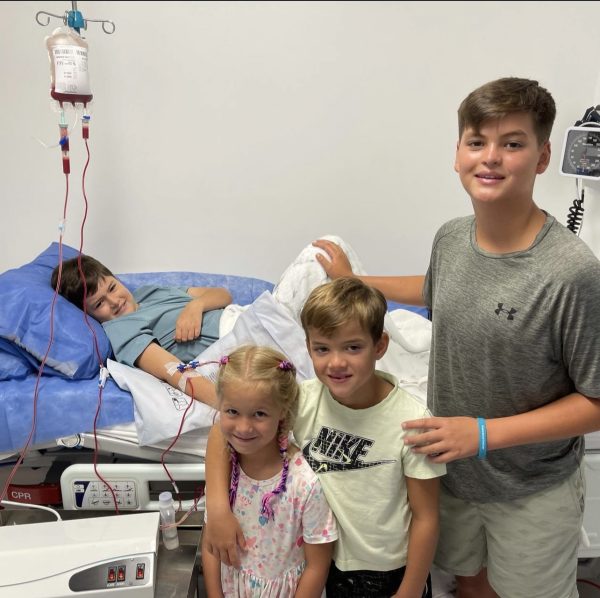
“We saw him starting to turn around,” she said. “To see him regain some strength and a sparkle back in his eye and not feel that great amount of suffering all day, every day.”
The nurses in Mexico were described as loving by Hannah. They called Whitman by his middle name, Luke, and even referred to him as ‘their little warrior’. Throughout his life, Hannah said her son has clung to his faith, being spiritual in nature.
“He’s [Whitman] had that since he was really little, that was something that was just kind of innate in him, but has been refined through the fire,” she said.
The Spires lived in Mexico from early June until mid-August. During this time, Whitman improved drastically, and Hannah and Chris were taught ways to better care for him and his condition, what medications to use and how to use them. Their son’s treatment ended in Mexico when his veins finally blew out. Morales said this was a sign to end treatment at the clinic for now and that the Spires should try to get him back home and acclimated into normal life.
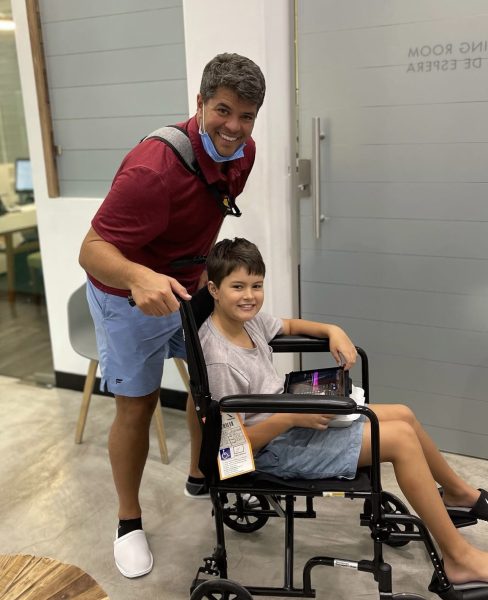
The fight didn’t end in Mexico back in 2021. Since 2021, Whitman has had surgeries and treatments done to help his body recover from what he’s been through and keep the Lyme count in his body down. He’s had multiple other diagnosis and problems as a result of Lyme. However, with research and advice from others, Hannah has found great doctors, physical therapists and specialists from across the country to be by Whitman’s side. He still has bad days, days where he vomits and feels weak. He has days that are so discouraging because it reminds the family of where they came from. But that’s why Hannah said she enjoyed keeping tabs, so she could show his doctors and see how far he’s come. But more than that, they were able to help others through the Whitman’s Warriors account. The account has grown over the past few years and now hundreds of people have reached out, many suffering from Lyme or know someone who is suffering. Through these interactions, the Spires have been able to help others by getting them in contact with certain doctors, giving advice and sending supportive words.
“If we hadn’t had the suffering, we wouldn’t be able to relate to people in their deep sorrow the way that we can now,” Hannah Spires said.
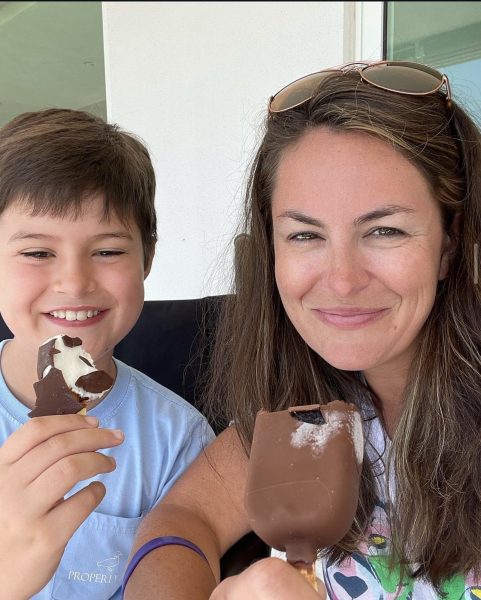
In addition to Whitman’s Warriors, Hannah said she joined the Global Lyme Alliance, a nonprofit organization that has donated over $19 million towards research about Lyme and other tick-borne disease. In addition to raising money, the GLA also provides a community for people who are suffering from the disease or know someone who is.
“I think there’s something to be said for really truly understanding someone else’s suffering and being able to walk with them through their suffering, having walked it yourself,” she said.
As for the present day, there is a special routine to keep Whitman’s health at bay. His morning begins with breakfast and a mixture of morning medications. He goes to different therapies several days a week including physical therapy, occupational therapy, pelvic floor therapy and postural vision therapy. He also has weekly blood work. In addition to his morning medication and various therapies, he receives up to six IV medications every day through the PICC line in his arm, which is a thin tube connected to his vein, efficient for frequent use of IV medication. He also has a double lumen, which cuts down drip time as two IVs can run at the same time. Because his IVs are administered at home, Hannah and Chris have learned how to prep an IV bag in a sterile field and administer the treatment.
Since the start in 2020, Hannah made it her mission to know exactly what was happening. She studied Lyme and learned the correct terminology for Whitman’s diagnosis including medical jargon. She insists that advocating for someone in a health situation is crucial, it’s something that could make or break their treatment. Hannah and Chris chose to fight for him, but that’s not a quality that only they needed to have, it’s one Whitman possesses the older he gets. Hannah makes sure to teach Whitman exactly what she’s doing when she administers his treatment. At only 13-years-old, Whitman can run his own PICC line.
“That’s one thing that I’ve tried to teach him this whole time is that if something ever happens to me, you have to fight for yourself the way I’ve been fighting for you,” she said.
There was no roadmap for the Spires in the beginning. They had no idea what was wrong with their child in late November 2020. They said they clung to their faith in God when it was hard. They held on to faith Christmas day 2020, when Hannah was worried that her son wouldn’t make it. They held on whenever their daughter, Sarah Jane, would have tea parties and they would hear Whitman in the room next door wailing in pain. They held on when they were on the flight to Mexico praying.
“I’d be lying if I said our faith wasn’t tested to the extreme. I wondered why we would cry out for healing and God wouldn’t answer,” she said.
Hannah describes various times during the years as dark. Times where she had to roll down the windows and turn up the music to distract herself from her own thoughts. Through this experience, she learned that she could be vulnerable, even as a pastor’s wife. She said because of what she’s been through, she can dig deeper into other’s suffering, having been through it herself. She appreciates and notices the other blessings that often go unnoticed like her other healthy children, the roof over their head, food and loved ones.
“I was finally able to be vulnerable in the position that I’m in and probably be the realest rawest version of myself that I’ve ever been because there’s no pretense left when your child’s about to die,” she said.
Along with Hannah appreciating the other blessings through this hardship, Chris said his kids were able to see their church as an example of a community coming together in one’s suffering. Hannah and Chris were also able to balance each other out. There was times Chris was having a horrible day processing everything and Hannah was able to help him and vice versa. They relied on their church community, each other and their faith in God.
So, why do bad things happen to good people?
Well, it’s a question that doesn’t have an answer and will never have an answer. It’s one some stay up at night asking. It’s one that crossed the minds of the Spires while they stayed up at night worried. It’s a concept that’s hard to process as an adult, but unfathomable for a child. Whitman said he clung onto his faith during this process and rejoiced that he was able to help others through his suffering.
“If you keep that faith, then even if you lose everything, you’ll still have that,” Whitman said.
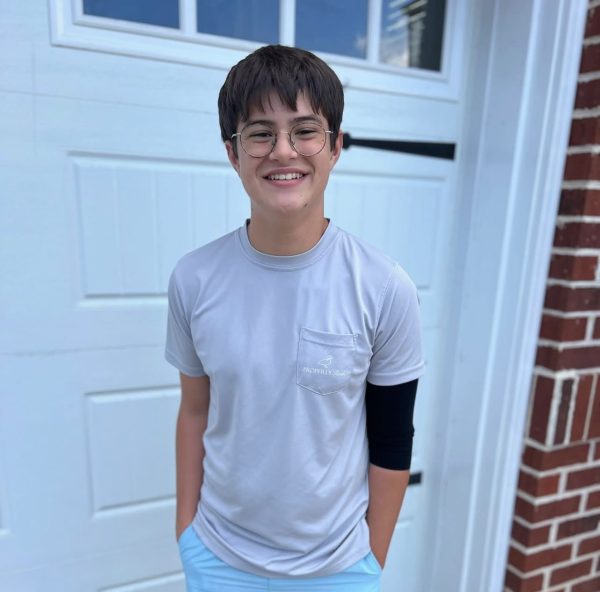
As Whitman sits in this classroom after school, it’s apparent that his illness has matured him. It’s made his demeanor different than most 13-year-olds. He doesn’t go on about trivial issues. This is a boy who knows how to run his own PICC line, a boy whose visited more doctors than those twice his age, a boy who knows what suffering is because he still suffers. He is knowledgeable about the Bible, having relied on it throughout his journey. He talks about the book of Job, and by his demeanor, it’s obvious he knows just as much about that book as some of the people sitting in the pews on Sunday. Speaking with Whitman feels like talking to an adult, someone who has wisdom from decades of experience.
Then he runs out to the basketball court, able to be a child again.
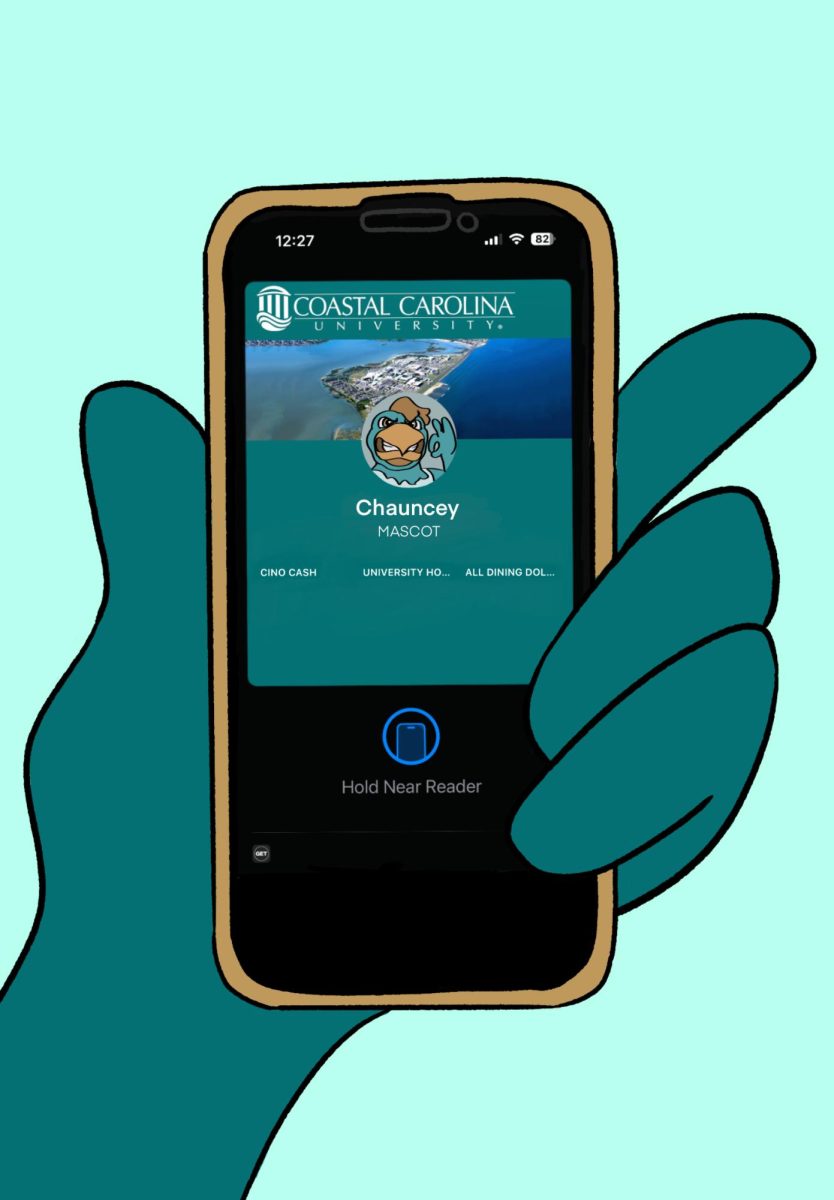

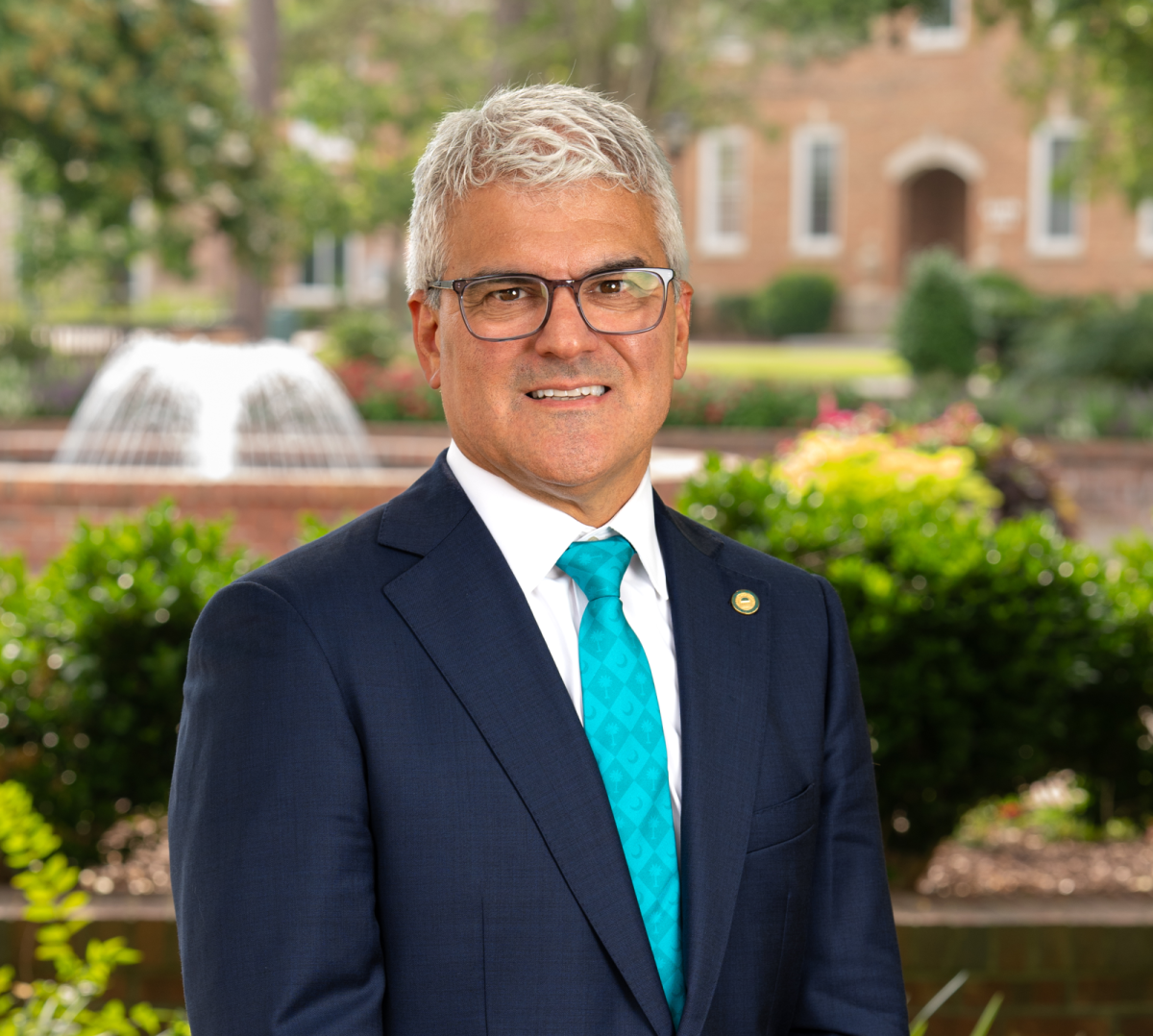

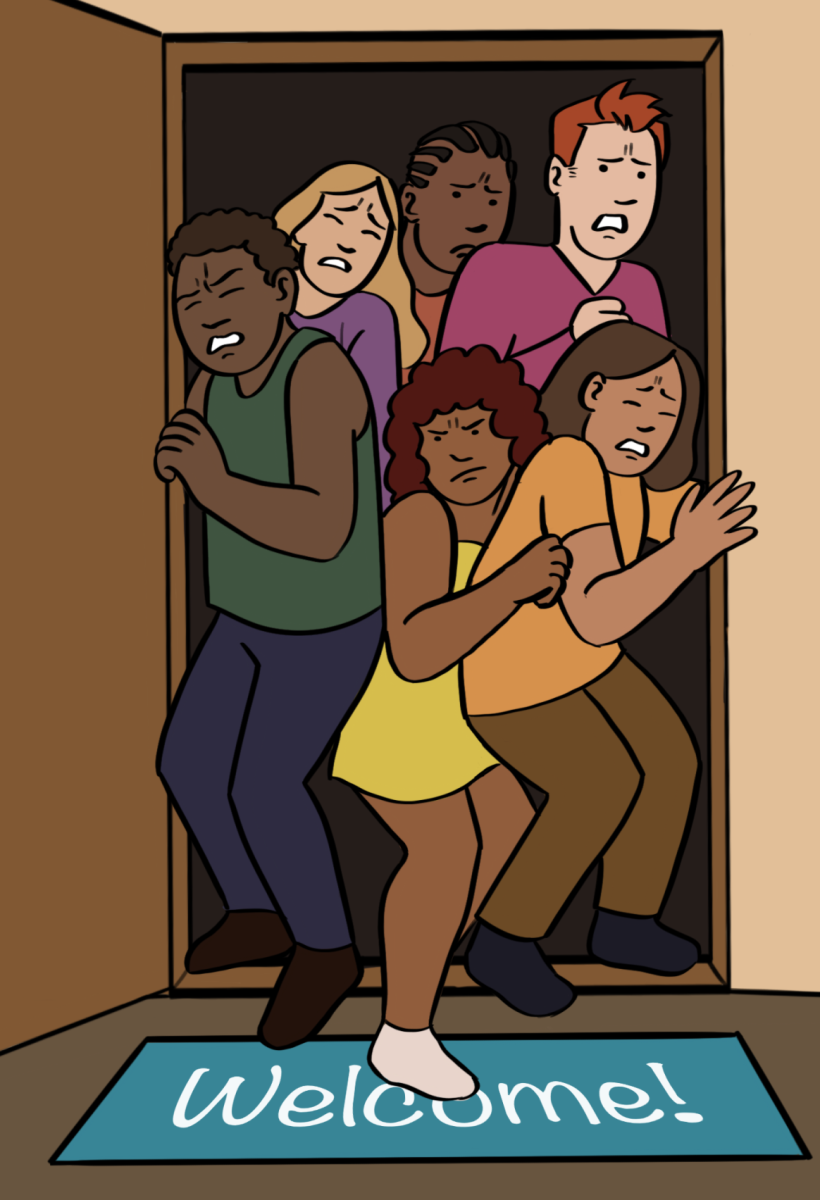





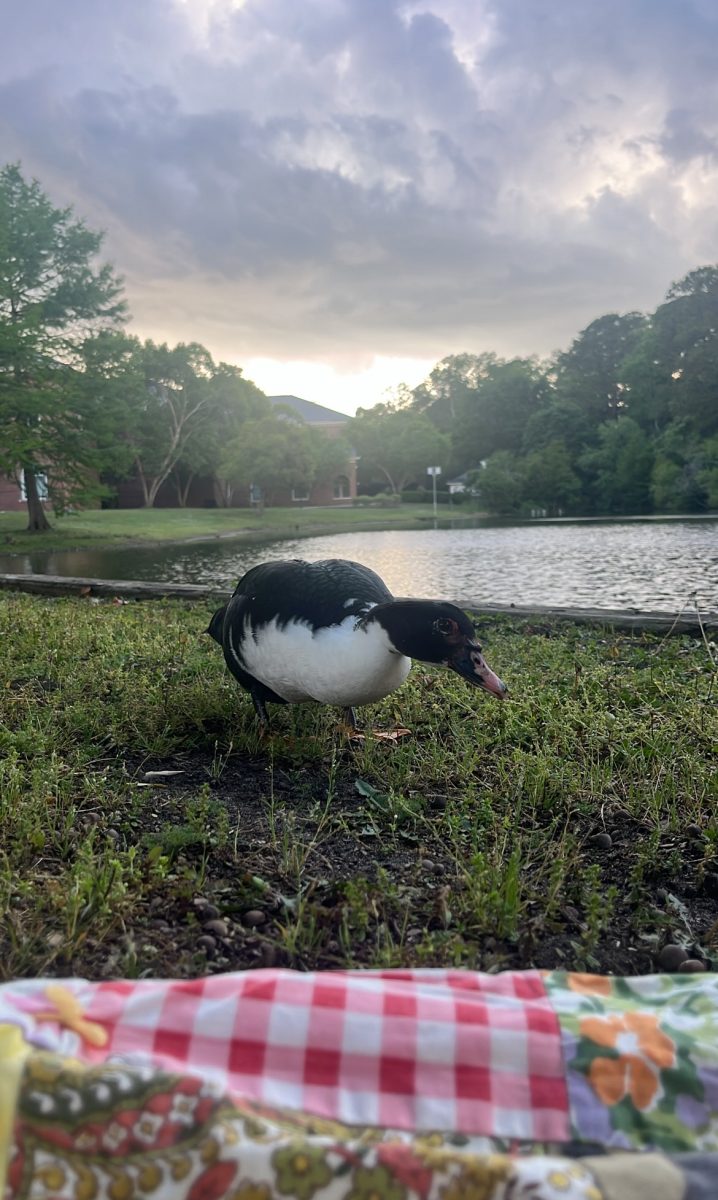


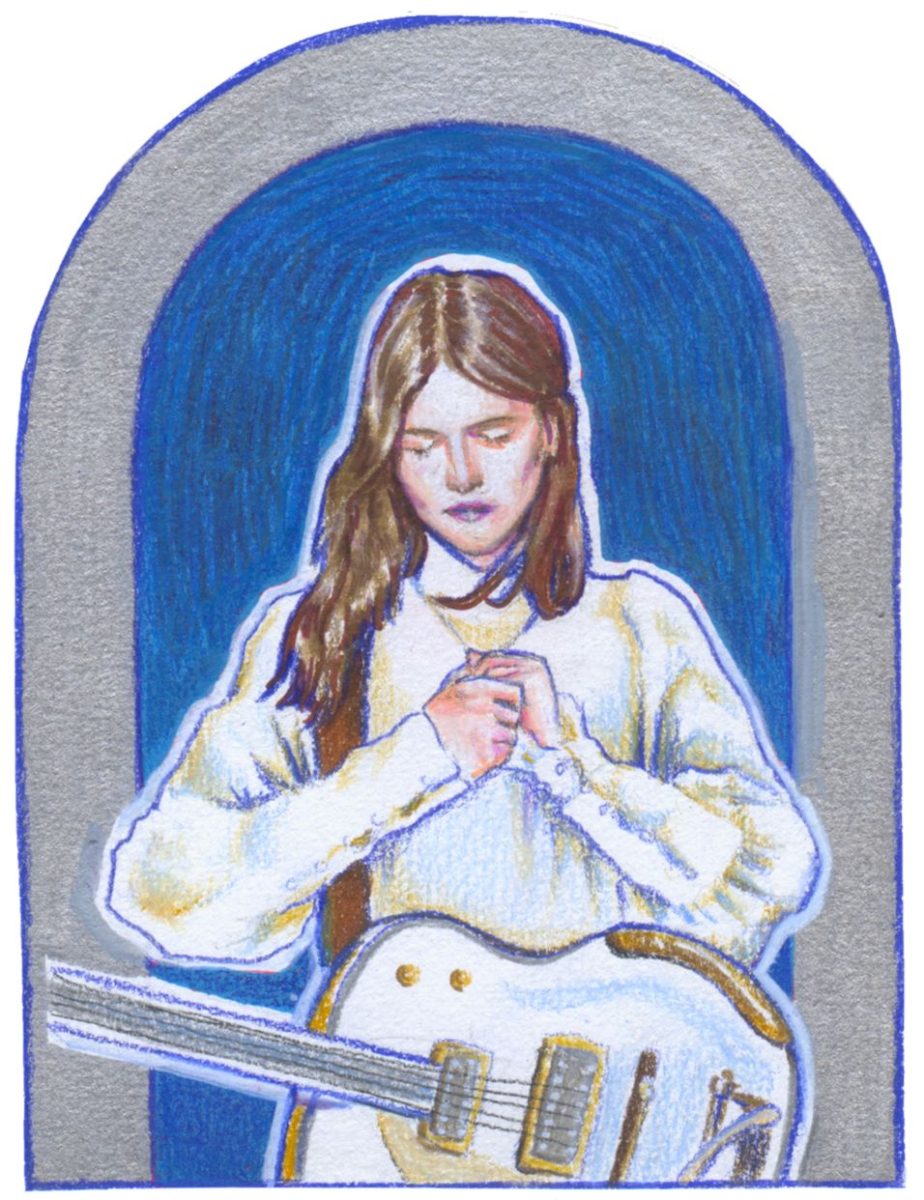



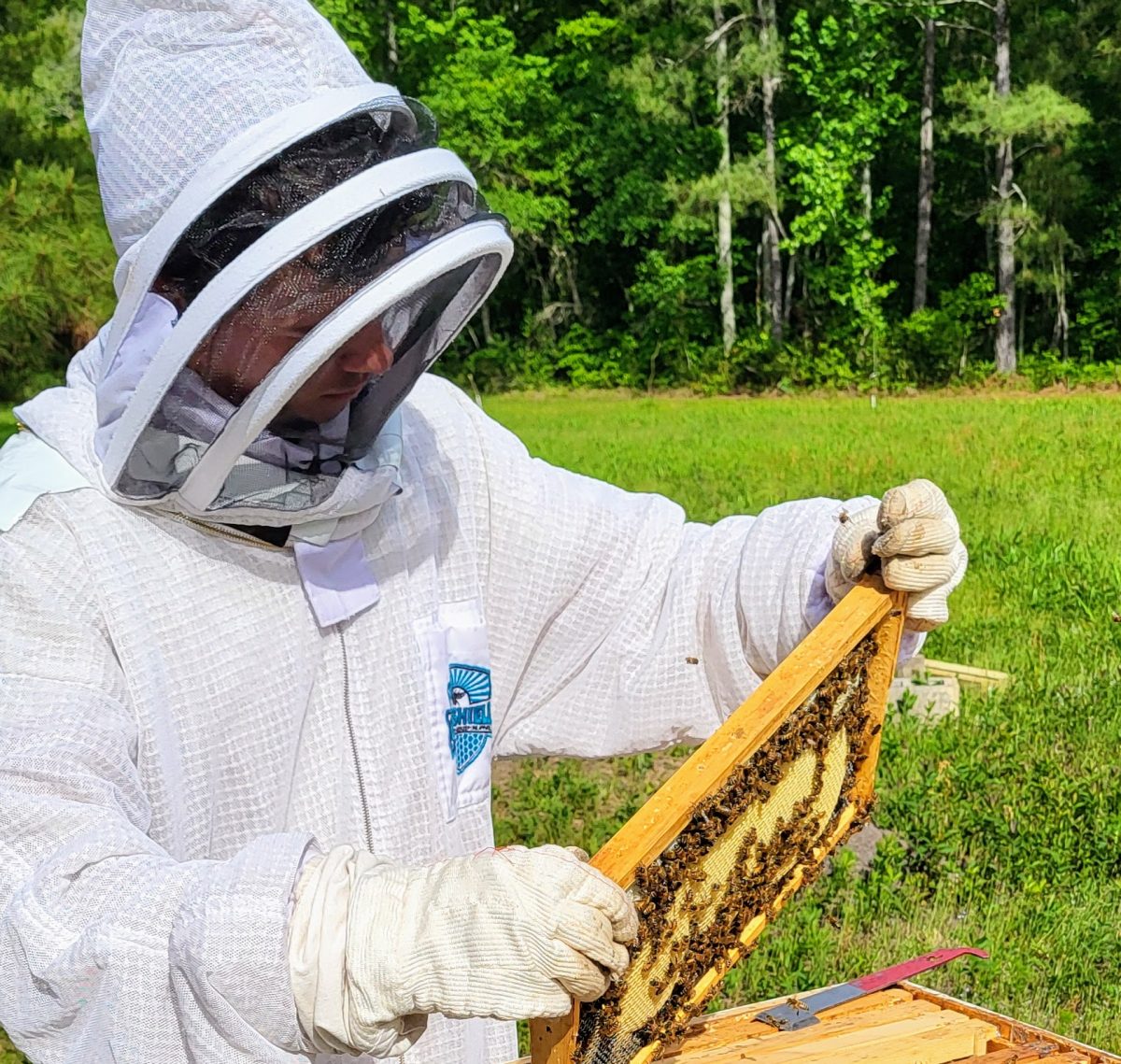





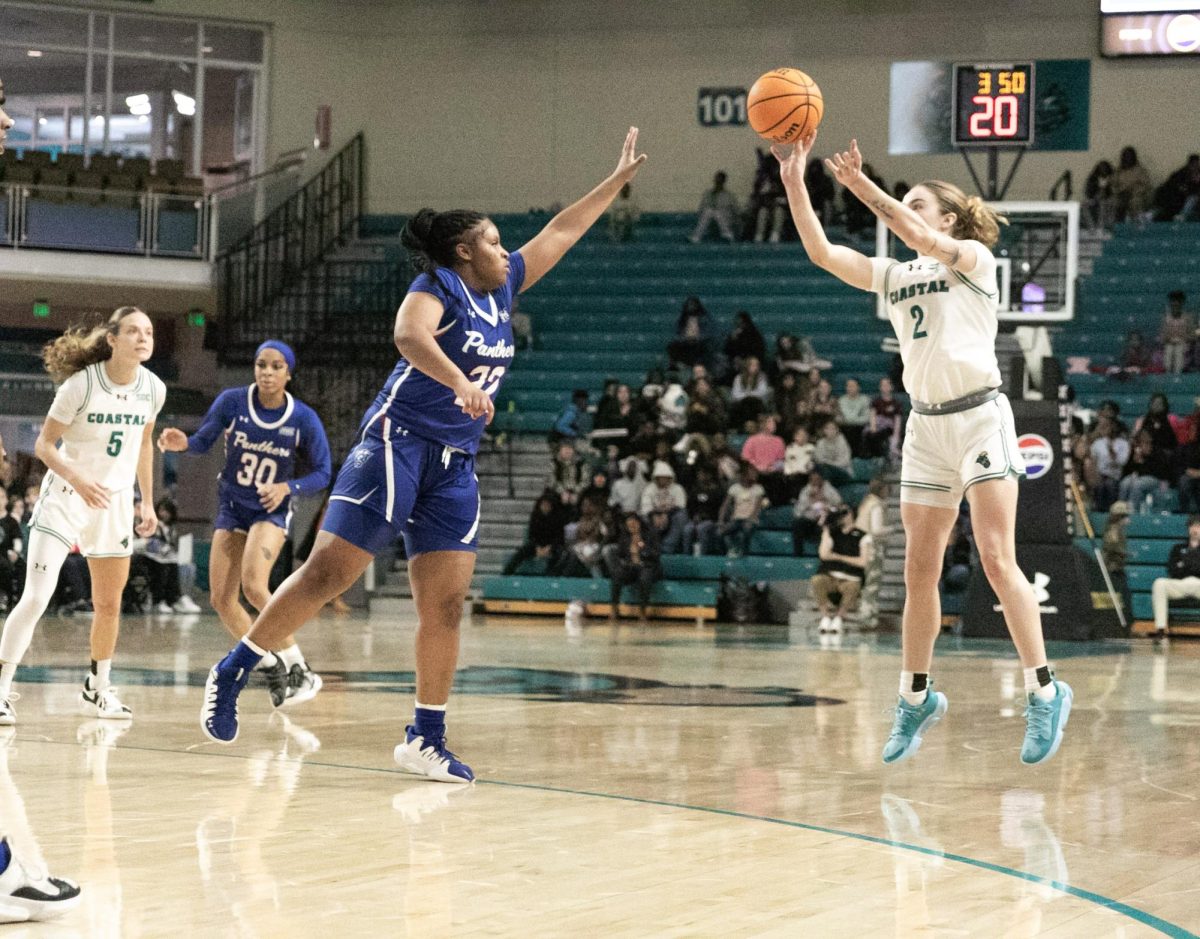


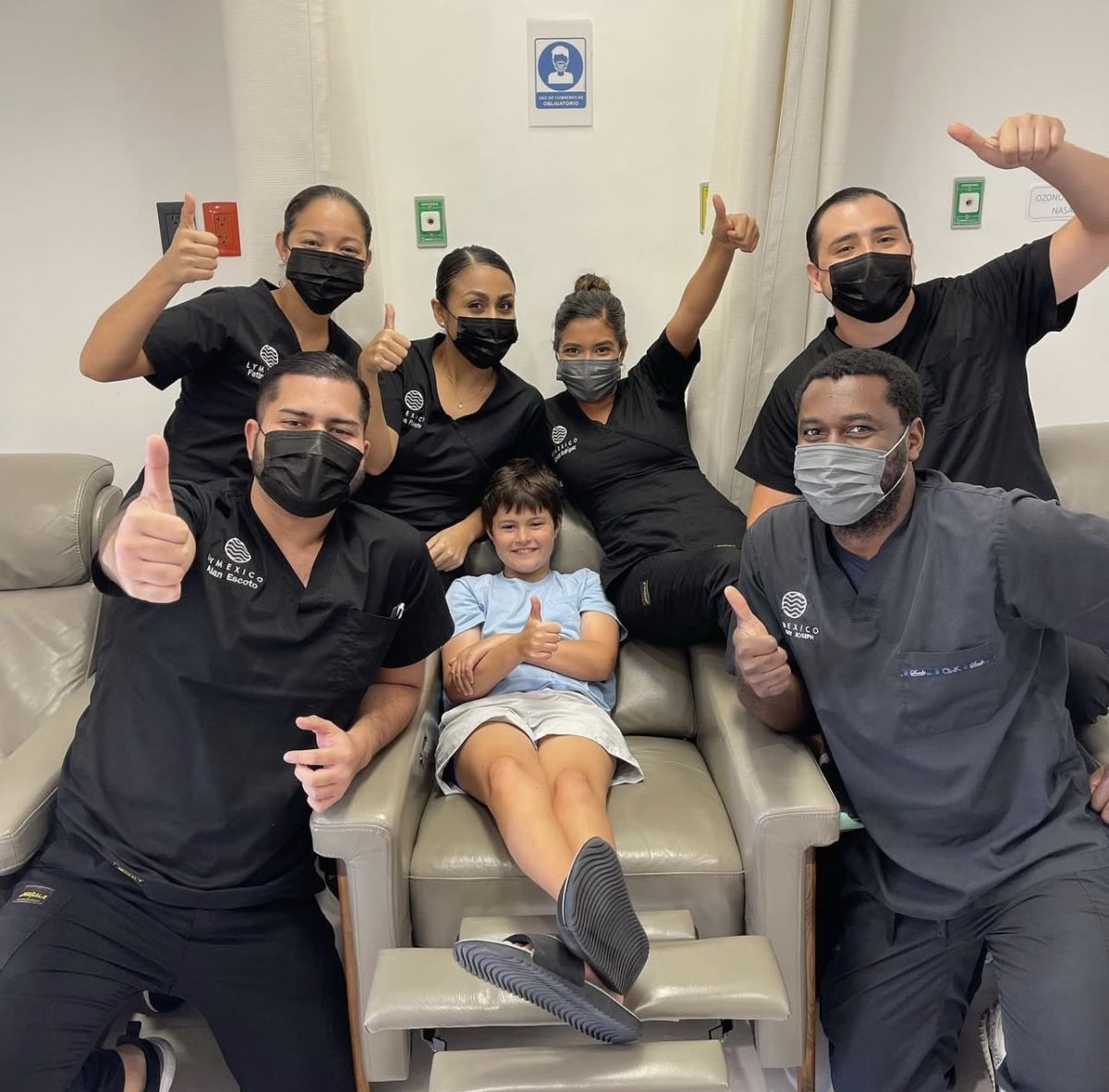


Claire Mortimer • Dec 19, 2024 at 10:35 pm
This poor boy needs to receive effective herbal medicines that work to treat Lyme disease. Scientific studies published in medical literature in 2020 demonstrated that certain specific herbal medicines are much more effective at killing the borrelia bacteria than pharmaceutical antibiotics.
Barbara Collins • Dec 10, 2024 at 11:06 pm
So thankful to Jesus to see Whitman in such better shape !!! We’ve been watching a true warrior right here before our eyes suffering and always at the end of the day having a smile on his face . At the same time watching parents struggling to understand what and why this was happening to their child . Parents that have kept their faith ! ❤️
Soo Taraschi • Dec 10, 2024 at 10:05 pm
This article is a sad but beautiful story; a real life story. God is good and to realize from this child and his family He will never leave you nor forsake you. Very well written by a compassionate author.